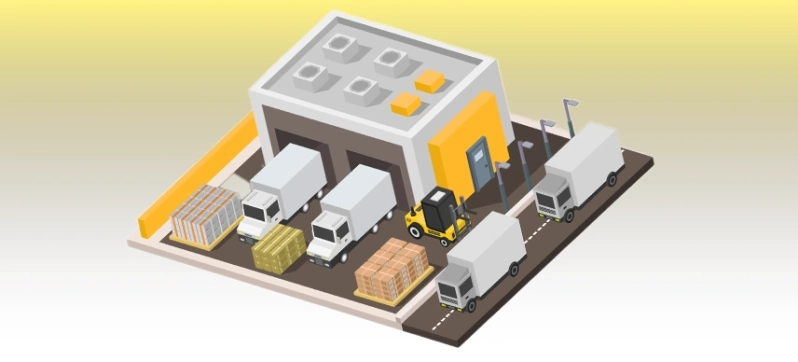
The smooth operation of supply chain processes, accurate inventory tracking and fast shipments are only possible with effective warehouse management. This process increases customer satisfaction by ensuring that customers receive their orders correctly and on time, and helps the business maintain its competitiveness. In addition, the risk of encountering problems such as excess or shortage of stock is minimized thanks to correct warehouse management.
ERP software offers an important solution to make warehouse management processes more effective and efficient. ERP (Enterprise Resource Planning) software integrates different departments of businesses such as finance, logistics, inventory, human resources and production under a single system. These software automate many functions from stock tracking to order management, saving time and reducing errors. ERP systems, especially those integrated with B2B software solutions, allow warehouse management to be done more systematically.
In this guide, we will examine in detail the tips and strategies needed for B2B e-commerce companies to optimize their warehouse management processes.
Warehouse Management and B2B E-Commerce
Warehouse management is the backbone of business processes in B2B e-commerce companies. In B2B business models, customer demands usually consist of large volume orders and need to be supported by fast delivery processes. At this point, effective warehouse management ensures that orders are prepared correctly, on time and completely. Disruptions in warehouse management can negatively affect customer satisfaction by extending delivery times. Conversely, a smoothly functioning warehouse operation helps companies stand out from their competitors.
To better understand the impact of warehouse operations on customer satisfaction and business efficiency, the following points are important:
- It ensures that the desired product is always available in stock.
- It enables orders to be delivered to customers in a short time.
- It reduces order errors and return processes.
- Provides automation with tools such as ERP and B2B software.
These factors not only increase customer satisfaction but also improve the overall business efficiency of the business. Efficient warehouse operations help reduce costs by optimizing the use of labor and resources. At the same time, strategic warehouse management contributes to the growth of the company and strengthens its presence in the market.
The Role of ERP Software in Warehouse Management

ERP software is a comprehensive system that brings together all processes of businesses under one roof and makes operations more efficient. The basic features of these software include many functions such as inventory management, financial analysis, supply chain integration and human resources management. ERP synchronizes different departments of businesses, shares data in real time and accelerates decision-making processes. Especially in dynamic processes such as warehouse management, ERP reduces complexity by ensuring that all data is organized and accessible.
Integration of ERP software with warehouse processes completely automates operations and prevents manual errors. This integration enables digital monitoring of all stages from the entry of products into the warehouse to their shipment. Warehouse workers can classify, place and prepare products for shipment correctly with the instructions they receive from the ERP system. In this way, processes proceed quickly and without errors.
To summarize the contributions of ERP software to warehouse management:
- Real-time inventory tracking: Current product status can be viewed instantly.
- Order and shipment integration: Accurate and fast processing of orders is ensured.
- Logistics planning: Delivery processes of products leaving the warehouse are optimized.
- Reporting and analysis: Business processes can be planned more effectively.
ERP has a huge impact on stock tracking, order management and logistics processes. For example, thanks to ERP, the amount of products in stock, expiration dates and location information can be viewed in seconds. In order management, ERP automates the entire process from order processing to shipment. In logistics processes, planning shipping routes and tracking deliveries becomes easier with the solutions offered by the ERP system. This holistic approach both saves time and reduces costs.
Advantages of Using ERP Software

ERP software provides great convenience in warehouse management by integrating all operational processes for businesses. This software not only organizes businesses' processes, but also offers many advantages such as cost and time savings. The main advantages of using ERP in warehouse management are:
- Reduces manual workload. Minimizes human errors thanks to automation of processes.
- Provides real-time data. All information regarding warehouse and inventory can be accessed instantly.
- It offers fast and accurate order management. Orders are processed quickly and shipped without errors.
- Reduces costs. Provides more efficient use of warehouse space and workforce.
- Provides reporting and analysis capabilities. Provides access to the data needed for better strategic decisions.
Some of these advantages will be discussed in detail later in the article. Especially critical issues such as operational efficiency, real-time data tracking and cost savings will show more clearly why ERP is indispensable for businesses.
Operational Efficiency
Automation of manual processes is one of the most important advantages of ERP software. In traditional warehouse management, processes such as manually checking stocks and manually processing orders are both time-consuming and error-prone. ERP software completely digitizes these processes, minimizing manual intervention. In this way, tasks such as order processing, inventory tracking and shipment preparation are carried out faster and more accurately.
ERP also significantly reduces error rates. For example, problems such as incorrect storage or shipping of a product can be easily prevented thanks to the system's automatic control mechanisms. This increases customer satisfaction and strengthens the reputation of the business.
Real Time Data Tracking
Real-time data tracking is one of the greatest advantages of ERP. Thanks to this system, the status of warehouse stocks and the location of products can be monitored instantly. For example, if a product is out of stock, the system can automatically give a warning and start the re-ordering process. This prevents delays that may occur due to stock shortages.
Instant data tracking also provides businesses with speed and accuracy in decision-making processes. Accurate data enables more effective decisions to be made in every area, from logistics processes to sales strategies. In this way, businesses gain an advantage over their competitors.
Cost Savings
ERP software allows for more efficient use of warehouse space. By classifying and storing products correctly, waste of space is prevented. In addition, the automation systems offered by ERP reduce the need for labor in warehouse management and enable employees to take part in more productive tasks.
In addition, ERP software contributes greatly to businesses in terms of time saving. For example, order preparation and shipping processes can be completed in a shorter time. This reduces the overall operating costs of the business and increases its profitability.
Things to Consider When Choosing ERP Software

Choosing the right ERP software for warehouse management directly affects the efficiency and competitiveness of your business. However, it is important to consider some basic criteria to determine the most suitable option among the many available options. An ERP software that suits your needs can provide great benefits to your business in both the short and long term. Here are the main points to consider during the selection process:
- Determine which processes of your business need ERP.
- It is important that the software is easy to learn and user-friendly.
- As your business grows, the software needs to keep up with your needs.
- The selected ERP software should offer specific solutions to sectoral needs such as B2B e-commerce.
- Choose a system that is compatible with mobile devices so you can access real-time data from anywhere.
- It is critical that the provider provides training and ongoing support.
- Make sure that the software's license and maintenance costs fit into your business budget.
Choosing the right ERP software is the cornerstone of increasing efficiency in warehouse management. A good ERP solution automates your business processes while reducing operational complexity and reducing your costs in the long run. Therefore, determining the most suitable ERP software for your business by paying attention to the above factors during the selection process is a critical step for your future success.
Tips for Successful ERP Integration
In order for ERP software to provide full benefits to your business, the integration process must be managed correctly. A planned and well-organized ERP integration increases business efficiency in every area, from warehouse management to logistics processes. Here are the tips to consider to successfully complete ERP integration:
- Create a clear integration plan: Determine which processes will be integrated into the ERP and in what steps this will be done.
- Conduct training programs: Provide comprehensive training so your employees can use the ERP software effectively.
- Make the transition in stages: Plan for a phased transition process rather than changing all systems at once.
- Perform data cleansing: Create a clean data infrastructure by removing unused or incorrect information from the system before integration.
- Choose the right provider: Make sure the company providing the ERP software can offer support during the integration process.
- Give importance to the testing stages: Before fully commissioning the software, make sure that the system works without errors with detailed tests.
A successful ERP integration will provide significant benefits to your business in the long term. With a planned process and the right strategies, seamless integration of ERP into business processes will increase the operational efficiency of your business while strengthening its competitiveness.
Conclusion

ERP software plays a critical role in warehouse management processes, allowing businesses to conduct their operations more efficiently, quickly and without errors. Correct management of warehouse stocks, timely and complete preparation of orders, and optimization of logistics processes are just a few of the basic advantages provided by ERP software. These features directly affect the success of companies, especially in the dynamic and competitive B2B e-commerce sector.
B2B e-commerce companies can gain a significant advantage over their competitors by using ERP software effectively. Features such as real-time data tracking, integration of operational processes and cost savings help companies both increase customer satisfaction and reach a stronger position in the market. In addition, companies that modernize their processes by using technology effectively have the chance to achieve sustainable growth in the sector in the long term.
As a result, choosing the right ERP software and conducting a successful integration process will enable B2B e-commerce companies to make a difference in warehouse management and increase their competitiveness in the market. Therefore, it is of great importance to evaluate ERP systems as a strategic investment.
You can also learn about other advantages of the subject in our article Inventory Management: Advantages of B2B ERP Software .























